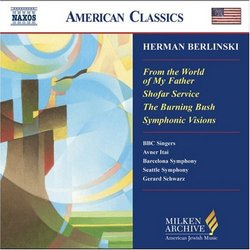| All Artists: Ted Christopher, Herman Berlinski, Avner Itai, Gerard Schwarz, Barcelona Symphony Orchestra, National Orchestra of Catalonia, Seattle Symphony Orchestra, Barbara Harbach, Christopher Bowers-Broadbent Title: Herman Berlinski: From the World of My Father (Milken Archive of American Jewish Music) Members Wishing: 1 Total Copies: 0 Label: Milken Archive Original Release Date: 1/1/2006 Re-Release Date: 8/29/2006 Genres: Special Interest, Classical Styles: Opera & Classical Vocal, Historical Periods, Modern, 20th, & 21st Century, Symphonies Number of Discs: 1 SwapaCD Credits: 1 UPC: 636943944622 |
Search - Ted Christopher, Herman Berlinski, Avner Itai :: Herman Berlinski: From the World of My Father (Milken Archive of American Jewish Music)
 | Ted Christopher, Herman Berlinski, Avner Itai Herman Berlinski: From the World of My Father (Milken Archive of American Jewish Music) Genres: Special Interest, Classical
Herman Berlinsky (1910-2001) was born in Leipzig of Russian emigré parents with strong Jewish roots. After studying piano and composition at the Leipzig Conservatory, he worked with Nadia Boulanger in Paris, but felt ... more » |
Larger Image |
CD Details
Synopsis
Amazon.com
Herman Berlinsky (1910-2001) was born in Leipzig of Russian emigré parents with strong Jewish roots. After studying piano and composition at the Leipzig Conservatory, he worked with Nadia Boulanger in Paris, but felt that she discouraged his Jewish musical predilections. However, he was supported and influenced by other French composers, notably Messiaen. His experience as arranger and composer for a troupe of survivors of the famous Yiddish art theater in Vilna proved important for his later American works. After settling in New York in 1940, Berlinsky received commissions from Temple Emanu-El to write for its services, and later became music director of Washington's Hebrew Congregation, a center for the city's finest sacred music, at the same time winning a reputation as interpreter and composer of Jewish organ music. The works on this recording display his stylistic versatility as well as the influence of his Jewish heritage; they are technically masterly, basically mournful, melodious, and often dissonant. "From the World of my Fathers" was written and premiered in Paris in 1938 but, along with other scores, lost in his emigration; Berlinsky reconstructed it from memory in America. Its four movements include two lyrical laments and two lively dances, one in Klezmer style. "Shofar Service" (1964) employs a real shofar, or ram's horn, two trumpets, organ, a chorus and a baritone solo sung in English. It is devout, solemn, tonal and beautiful, while "The Burning Bush" (1956) for organ, inspired by the biblical story, uses a twelve-tone row. The tone poem "Symphonic Visions" (1949), is also based on biblical allusions. Beginning with pounding timpani beats, its three slow movements alternate soft, mysterious passages with driving, agitated climaxes and end in peaceful tenderness. The performances are first-rate throughout. --Edith Eisler

 Track Listings (11) - Disc #1
Track Listings (11) - Disc #1